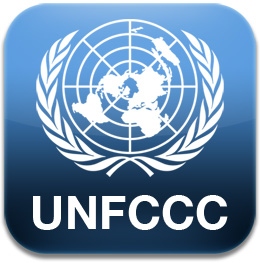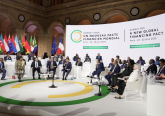
Since the collapse of the 2009 Copenhagen conference, much of what has gone on at the negotiating sessions of the UN Framework Convention on Climate Change (UNFCCC) has slipped off the radar of both public and political attention. But a new chapter in the international climate change negotiations begins this year – and could be a unique moment in efforts to craft international agreement on how the world will collectively attempt to slow global climate change.
This week, the Durban Platform working group (ADP) is convening in Bonn, Germany, for the first of three meetings in 2013, moving in earnest towards its 2015 deadline to agree a new international treaty to succeed the Kyoto Protocol and enter into force in 2020. But while the ADP negotiating process had been launched at the 2011 Durban conference, its progress last year was dogged by deep conflict over how to organise its work, partly in view of substantively similar issues being discussed in parallel negotiating processes, and thus resulting in disagreement over the right procedural ‘home’ for substantive discussions.
Two other sets of processes – on the fate of the Kyoto Protocol’s second commitment period, and on ‘Long-term Cooperative Action’ (LCA) – were brought to a conclusion at last year’s Doha conference and streamlined into existing institutions and bodies. Thus, now free of the procedural morass that characterised UNFCCC negotiations in 2012, the ADP process that unfolds over the next three years represent what may be seen as a contingent moment in the history of the UN climate negotiating process, where fundamental questions over the design and scope of an international agreement are up for grabs in a way and manner perhaps unseen since the beginning of the initial intergovernmental negotiations at the end of the 1980s.
Around the rooms and corridors of the climate negotiations, an oft-heard phrase is that ‘context shapes content’, a reference to the way in which previous decisions and agreement carefully sets the boundaries of what can be agreed substantively at any given session. In 2013, with the Kyoto and LCA negotiating tracks no longer defining the main focus for negotiations, the context for the ADP is dramatically different than it was a year ago, free to stretch its legs and begin to chart a way forward without being accused of prejudging decisions taking place in the other negotiating tracks.
This is, therefore, a tremendously febrile moment, fertile for new ideas and approaches that have been buzzing around the past few years from think tanks, NGOs and academia, to finally make it into the substance of a new intergovernmental agreement. It is a moment that can be a profoundly creative one, with a bit more space to explore and imagine different ways of proceeding. And it is, most importantly, a unique moment, one where the procedural constraints that so tightly structure the negotiating process have been momentarily relaxed. Both previous ‘big bang’ moments for the UNFCCC process – Kyoto in 1997, and Copenhagen in 2009 – were directed by negotiating mandates that had relatively clear parameters, even if these were contested by some. Agreement on the Kyoto Protocol had been guided by the 1995 Berlin Mandate that limited binding emission reductions to developed countries; and the attempt at a new agreement in Copenhagen had a full-blown agenda specified in the 2007 Bali Action Plan.By contrast, the ADP mandate is relatively non-prescriptive, simply setting out a goal for a legal instrument to be agreed by 2015 and an interim process to raise mitigation ambition in advance of this legal instrument coming into force in 2020.
The co-chairs of the ADP process, for their part, recognise that the carefully-crafted ambiguity of their mandates provide an opportunity for negotiators to reflect on the very purpose of an international agreement, and not just its content and form. Questions that they have asked negotiators to address in forthcoming discussions are strikingly open-ended: “How would the agreement be designed to ensure durability and flexibility to respond to changes in national circumstances and evolving scientific knowledge over time?”; “How will the principles of the Convention be applied in the new agreement?”; and “Are new arrangements needed in the 2015 agreement to ensure transparency of action and support and, if so, which?”
These, and the other questions that the co-chairs have framed for discussion, are remarkable because they address deeply the core normative issues of the negotiations that have simmered away in recent years but which have been perennially dodged rather than confronted: How should the benefits and burdens of climate action be distributed in a diverse world? In effect, they almost resemble an effort to design the new agreement beginning with a blank sheet of paper, loosened from the norms that have guided the past two decades of the climate negotiations.
As the ADP talks proceed, the institutional machinery of the UNFCCC process rumbles on as the new institutions established in the past two years, especially the Green Climate Fund, find their footing and begin the work of implementing their mandates. And wider developments, most recently the crisis that the EU’s Emissions Trading Scheme finds itself in and the collapse of the carbon price, obviously condition the demands and flexibility that governments come to the UNFCCC negotiating table with. Nonetheless, at this particular negotiating venue, we are now entering a moment where there is at least the space for far more creativity and innovation than what the memory of recent disappointments might suggest.
In the years since Copenhagen, those inside and outside the political drama of what goes on at the UNFCCC process have come to recognise the multilevel, multilayered nature of global climate action, where an intergovernmental treaty is just one, and perhaps not even the most central, element. But some kind of binding international agreement still remains the political lodestar for many, and the ADP’s 2015 deadline is now the date that looms on the horizon. Many have bemoaned the glacial, circular and halting pace of progress in the UN climate negotiations. The next three years – in a negotiating context wholly distinct from previous ones – may present a unique opportunity to break that mould.
Nicholas Chan is a DPhil student in International Relations at Oxford University. You can read his blog, Nick and the World.







1 Comment